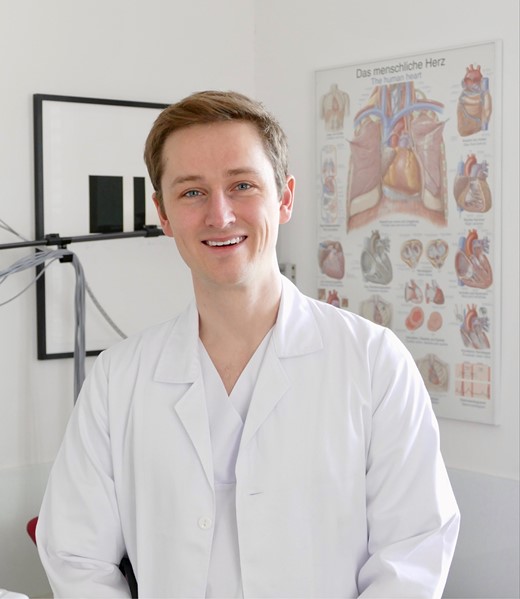-
PDF
- Split View
-
Views
-
Cite
Cite
Judith Ozkan, Rising stars in cardiology: Florian A. Wenzl, European Heart Journal, Volume 45, Issue 27, 14 July 2024, Pages 2358–2359, https://doi.org/10.1093/eurheartj/ehae186
Close - Share Icon Share
All correspondence relating to this paper should be sent to: [email protected]
Florian A. Wenzl, MD, of the Center for Molecular Cardiology at the University of Zurich, Switzerland, is making a name for himself in the field of risk prediction in cardiovascular disease. A project that focused on predicting adverse outcomes in patients with acute coronary syndromes (ACSs) earned him a European Society of Cardiology (ESC) Young Investigator Award (YIA) in Clinical Science at the 2023 Congress (Figure 1).

Born and raised in Austria, with periods in the USA, Dr Wenzl’s upbringing in a medical family may have laid the foundation for his early interest in medicine. After completing his medical degree at the Medical University of Graz, Austria, he trained in the USA at the University of Pennsylvania and went on to Germany to complete a fellowship focused on interventional cardiology at the German Heart Centre in Munich.
He joined the University of Zurich in 2021 as a postgraduate researcher working on risk prediction modelling and biomarker research to refine personalized treatment strategies. Dr Wenzl serves on the steering committee of AMIS-Plus—the Swiss National Registry of Myocardial Infarction—is a fellow of the Karolinska Institute, Sweden, and works closely with the UK National Institute for Cardiovascular Outcomes Research (NICOR), University College London, and Imperial College, London. Harnessing the world’s largest patient cohorts and emerging biomarkers, Dr Wenzl and his team in Zurich are at the forefront of developing novel means for cardiovascular risk prediction.
Dr Wenzl says his aim in research and clinical practice alike is to eventually improve and prolong life. He acknowledges his broad background in medicine, molecular biology, clinical science, and biostatistics as a potent combination in seeking solutions to unmet clinical needs. He says, ‘I think this may have contributed to being able to see things a little bit earlier and a bit differently compared to others. At the end it all comes down to asking the right questions’. He owes a great debt of gratitude for the ‘priceless guidance’ and support from Professor Thomas F. Lüscher, who has been his main mentor over the years.
Dr Wenzl emphasizes the importance of digital skills in refining cardiovascular risk assessment tools such as the Global Registry of Acute Coronary Events (GRACE) score. Leveraging artificial intelligence (AI) approaches, he recently developed GRACE 3.0, which led to significant improvements in predicting risks associated with ACS in both men and women. The findings, which reduce sex inequalities in clinical risk stratification, were published in The Lancet.1 Dr Wenzl credits his analytical thinking and programming skills—particularly in applying machine learning algorithms—for early progress in the field, leading to one of the first major AI-based tools for early risk assessment in ACS.1,2
The YIA-winning study, ‘Dipeptidyl peptidase 3 plasma levels predict cardiogenic shock and mortality in acute coronary syndromes’,3 identifies circulating dipeptidyl peptidase 3 (cDPP3) as a novel biomarker of cardiogenic shock and increased mortality in patients with ACS. It identified the intracellular metallopeptidase DPP3, which, upon release into extracellular space, disturbs blood pressure regulation and exerts cardio-depressive effects on the left ventricle, crucial factors in cardiogenic shock development. The DPP3 assay for measuring this angiotensin II–cleaving protein had been developed recently, with early pilot studies suggesting its potential relevance to cardiogenic shock. In a prospective multi-centre cohort study (SPUM-ACS Biomarker Study), the team in Zurich conducted serial blood sampling on patients with ACS both at presentation and 12–24 h later, revealing cDPP3’s strong association with cardiogenic shock and mortality, above and beyond established risk factors. Cardiac magnetic resonance imaging further confirmed its link to myocardial scar size. Circulating DPP3 emerged as a novel marker for cardiogenic shock development and mortality risk in patients with ACS.
The award-winning study took around 2 years from conception to publication. That the findings are clinically applicable—bedside tests for clinical measurement of cDPP3 are currently in development—is very gratifying for the team. The study also set the stage for a multi-centre randomized controlled trial on anti-DPP3 antibody therapy in patients with cardiogenic shock. He says, ‘Winning the Award was a huge honour and a privilege for me, but credit should also go to the whole team behind the curtain who supported me. The award committee seems to have appreciated the clinical potential of the study to help patients have better outcomes in future. We are already working on a randomized clinical trial assessing the safety and efficacy of targeted antibody treatment in patients with cardiogenic shock’.
Dr Wenzl hopes the study will pave the way for future collaborations in Europe and beyond. Biomarkers, along with AI technologies, he says, open up many opportunities to improve personalized treatment in cardiovascular medicine. This may be particularly important to address unmet needs including those that often lie in sex inequalities and among under-represented groups, such as ethnic minorities. He advises aspiring researchers that collaboration is key: ‘Research is a team sport. If you’re inclined towards quantitative thinking and have a solid clinical education, you should consider merging these skills. It’s a potent combination for making a difference in research’. He adds, ‘I would like to thank the whole SPUM-ACS study group and our industry partners for their continuous support’ (Figure 2).

Commenting on the Award, supervisor Thomas F. Lüscher said, ‘ACS and heart attacks have been a major focus of my laboratory in Zurich for the last 15 years and our strategy for many years has been to better understand some of their mediators. In that sense, this is one of the most exciting projects that we have seen because it seems that this marker that was the subject of the Award, is an enzyme that interferes with the control of blood pressure and cardiac function and may actually be a target. Since the company that measured it for us has a blocking antibody for this peptide, we’re discussing a trial in cardiogenic shock, so this work is very exciting and is a real door opener for a clinical intervention’.
‘This marker is so important that it can predict which patients will develop cardiogenic shock as soon as they come into the emergency department feeling slightly shaky. Furthermore, this marker has a short half-life, so that changes in it at the 24-hour mark are very predictive of who will recover or who will go down a more dangerous route. Also, its involvement in control of blood pressure and cardiac contractility and inflammation makes it a very interesting therapeutic target. This is particularly important because in cardiogenic shock, since balloon angioplasty and stenting, mortality has remained stable at around 40 to 50%, so we’re very excited that this could be a new step in improving the management of these patients with such unfortunate outcomes’.
‘Florian is one of the best students I have had. He is really smart and has a good knowledge of how to use new digital tools and employ AI. He is a master of statistics and very good at handling large datasets. He is enthusiastic and motivated and it’s clear that he will do very well’.
Declarations
Disclosure of Interest
All authors declare no disclosure of interest for this contribution.



